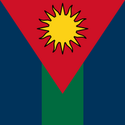Difference between revisions of "Illte (kingdom)"
Koppadasao (talk | contribs) m |
Koppadasao (talk | contribs) m |
||
| Line 4: | Line 4: | ||
|common_name = Illte | |common_name = Illte | ||
|image_flag = Flag of Illte.svg | |image_flag = Flag of Illte.svg | ||
| + | |image_flag2 = Banner of Illte.png | ||
|national_motto = “May they in Death receive the peace they didn't get in dying.” | |national_motto = “May they in Death receive the peace they didn't get in dying.” | ||
|capital = [[Illome]] | |capital = [[Illome]] | ||
Revision as of 19:24, 1 May 2013
| The Kingdom of Illte Рҩј δє Іљте (Xauj deu Illte)
|
||||
|---|---|---|---|---|
|
||||
| Motto: “May they in Death receive the peace they didn't get in dying.” | ||||
| Capital | Illome | |||
| Largest city | Tellmarch | |||
| Official languages | Delang | |||
| Recognised national languages | Zhonyo | |||
| Non-Homi languagea | Panomi | |||
| Ethnic groups (1112) | b | |||
| Demonym | Illomi | |||
| Government | Democratically Elective Monarchic Totalitarian democracy w/Demarchic local Nomocracy. | |||
| - | King | Karill of Umojde | ||
| - | Sowyet King | Zara Jeanie MaqiPanill | ||
| Legislature | Sowyet | |||
| Established by coronation | ||||
| - | Coronation of Qakhomatze | 22 | ||
| - | Meeting the Zhonyo | ca. 253 | ||
| - | The Dark Age of Banking | 287-401 | ||
| - | Capital moved to Illome | 622 | ||
| - | The Digital Revolution | ca. 698-ca. 804 | ||
| - | Meeting the Panomi | 1112 | ||
| Currency | ||||
| Drives on the | right | |||
| a. | Languages belonging to different humanoid species | |||
| b. | Also some Panomi in their village Pawophi near Karomill | |||
| c. | Multiple currencies are in use in Illte | |||
Illte (Delang: іљте (illte), IPA: /iɭte/), officially Kingdom of Illte, is a unitary Democratically Elective Monarchic Totalitarian democracy whose territory comprises the Homi-inhabited tropical and subtropical portion of Illte. Further south lies the, yet to be claimed, forest belt. The millennium city, Karomill, being the most southern Illomi city, boarders the forest belt. From recent discovery, it has become known that the forest belt is inhabited by the non-Homi Panomi species, who has been responsible for several attacks on Karomill citizens over the last hundred years.
Contents
Etymology
Illte consist of the Delang word for island (Delang: іљ (ill), IPA: /iɭ/) and the suffix for continent (Delang: те (te), IPA: /te/), an abbreviation of the word for continent (Delang: телјен (teljen), IPA: /teljen/), which is a derivative of the word for earth, or land, (Delang: телј (telj), IPA: /telj/). The literal meaning of Illte is thus Island Continent.
The Demonym, illomi (Delang: Іљомі (Illomi), IPA: /iɭu:mi/), is a contraction of island and Homi (Delang: Ƕомі (Homi), IPA: /hu:mi/), meaning Island People.
History
Prehistory
Little is known about the continent from prehistoric time, but several discoveries has been made. In several places, the sea floor contains signs of previous settlement. Carbon dating estimate these settlements to be at least 10,000 years old. From the almost random placement of these settlement, it is surmised that all of Tejmokh once was dry land.
Start of Illomi history
The Kingdom of Illte was established in 22 a.Q, by the coronation of Qakhomatze. At the time of establishment, The Kingdom of Illte only consisted of the three settlements Tellmarsh, Grune and Umojde, each on their own island in The Tripoola Lagoon, it's circumferential skerries, and Mezeqeuy, the then known western part of The Equatorial Barrier Reef. After the first census of the population, in 25 a.Q, it was recorded that Qakhomatze ruled over 8,257 subjects (2,912 men, 2,762 women and 2,583 children).
Geography
Politics
National politics in Illte has changed dramatically since the Dark Age of Banking, when politics was ruled by Gold and power. Today politics is reduced to sporadic lawmaking sessions and simple record keeping. The parliament are usually only assembled twice-yearly, each session lasting between 1 and 3 weeks. The parliament are by law only required assemble once each year, in addition the cabinet assembly which are held after each parliamentary election. For the last 14 election, it has been tradition to hold a 1 week assembly 6 weeks before the election.

